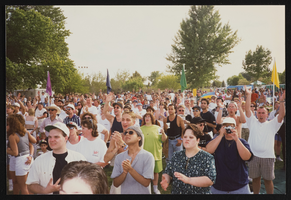Search the Special Collections and Archives Portal
Search Results

Crowd watching Cyndi Lauper perform at Gay Pride, image 012: photographic print
Date
Archival Collection
Description
Gay Pride 1997 (Dennis McBride, photographer), Sunset Park, 5-10-97. Cyndi Lauper entertaining.
Image
Ethel S. Hatch oral history interview
Identifier
Abstract
Oral history interview with Ethel S. Hatch conducted by P. Kohlman on November 24, 1975 for the Ralph Roske Oral History Project on Early Las Vegas. This interview covers the history of Las Vegas from 1939 to 1975. Mrs. Hatch also talks about ranching in Nevada, Rex Bell, development on the Strip, the first hotels, and early local shopping culture. The interview concludes with discussion surrounding tree-lined streets, the Helldorado Club, and Fremont Street.
Archival Collection
Bunny Harris oral history interview
Identifier
Abstract
Oral history interview with Bunny Harris conducted by Kenneth P. Young on February 28, 1979 for the Ralph Roske Oral History Project. This interview offers an overview of the history of Las Vegas, including transportation, mining, farming, ranching, and housing. During the interview, Mrs. Bunny Harris discusses the Elks Club, Cashman Field, McCarran Airport, Howard Hughes and Nellis Air Force Base.
Archival Collection
Lawrence Hawley oral history interview
Identifier
Abstract
Oral history interview with Lawrence Hawley conducted by Andy Sturgeon on March 13, 1981 for the Ralph Roske Oral History Project on Early Las Vegas. The two discuss how Hawley first came to Nevada, as well as his personal family history. Hawley describes Hoover Dam as it was being built, the effects of the Depression on Nevada, and how Las Vegas has grown in size. Hawley also discusses liquor laws and how practicing law has changed since he first moved to Nevada.
Archival Collection
Las Vegas Fiber Arts Guild oral history project interviews
Identifier
Abstract
The Las Vegas Fiber Arts (LVFA) Guild oral history project interviews (2020-2023) consist of interviews conducted by the LVFA Guild of their membership. The interviews cover a wide range of topics, and members discuss their individual history of weaving and the fiber arts, preferred methods, and different types of fibers. Interviewees also discuss mentors within the craft, their level of involvement with the guild, and the different events that the LVFA Guild organizes in Las Vegas, Nevada. Digital audio and transcripts available.
Archival Collection
John Hirsch oral history interview
Identifier
Abstract
Oral history interview with John Hirsch conducted by Shannon Morrison on March 20, 1978 for the Ralph Roske Early Las Vegas Oral History Project. Hirsch discusses his personal history, experiences in Las Vegas, Nevada, and his thoughts on the types of changes the city went through since his move to the city in 1937.
Archival Collection
Charles Adams oral history interview
Identifier
Abstract
Oral history interview with Charles Adams (born 1930 in Juliet, Illinois) conducted by Robert Melcer on February 27, 1979 for the Ralph Roske Oral History Project on Early Las Vegas. The two discuss various topics, including Adams’s move to Southern Nevada, the growth of Las Vegas, the educational system, the growth of the English Department at the university, cultural and recreational activities for locals, raising a family in Las Vegas, and prostitution in Southern Nevada.
Archival Collection
Olga Zampini oral history interview
Identifier
Abstract
Oral history interview with Olga Zampini conducted by Kevin Williams on February 13, 1979 for the Ralph Roske Oral History Project on Early Las Vegas. Zampini discusses Las Vegas, Nevada history.
Archival Collection
Claytee D. White oral history interview
Identifier
Abstract
Oral history interview with Claytee D. White conducted by Jessica Avila Pifferrer on December 01, 2014 for the African Americans in Las Vegas: a Collaborative Oral History Project. In this interview, White discusses her career as the Director of the Oral History Research Center at the University of Nevada, Las Vegas (UNLV) Libraries. She describes why she moved to Las Vegas, Nevada in 1992, enrolling in the American History master's program at UNLV, and participating in the Women in Gaming and Entertainment project. She talks about memorable interviews she has conducted, including interviews with the African American community of Las Vegas.
Archival Collection
Linda Hartley oral history interview
Identifier
Abstract
Oral history interview with Linda Hartley conducted by Pauline Marchese on March 10, 1978 for the Ralph Roske Oral History Project on Early Las Vegas. During the interview, the two discuss Hartley’s personal history, such as schools that she had attended and her recollection of local recreational activities. The two go on to talk about changes in crime, the environment, and briefly discuss a variety of issues at the time, including: segregated schools, prostitution, and effects of the Nevada Test Site.
Archival Collection
